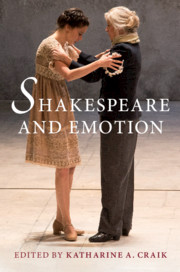Book contents
- Shakespeare and Emotion
- Shakespeare and Emotion
- Copyright page
- Contents
- Figures
- Contributors
- Acknowledgements
- Note on Text
- Introduction
- Part I Contexts
- Part II Emotions
- Chapter 13 Fear
- Chapter 14 Grief
- Chapter 15 Sympathy
- Chapter 16 Shame
- Chapter 17 Anger
- Chapter 18 Pride
- Chapter 19 Happiness
- Chapter 20 Love
- Chapter 21 Nostalgia
- Chapter 22 Wonder
- Chapter 23 Confusion
- Bibliography
- Index
Chapter 18 - Pride
Coriolanus
from Part II - Emotions
Published online by Cambridge University Press: 01 October 2020
- Shakespeare and Emotion
- Shakespeare and Emotion
- Copyright page
- Contents
- Figures
- Contributors
- Acknowledgements
- Note on Text
- Introduction
- Part I Contexts
- Part II Emotions
- Chapter 13 Fear
- Chapter 14 Grief
- Chapter 15 Sympathy
- Chapter 16 Shame
- Chapter 17 Anger
- Chapter 18 Pride
- Chapter 19 Happiness
- Chapter 20 Love
- Chapter 21 Nostalgia
- Chapter 22 Wonder
- Chapter 23 Confusion
- Bibliography
- Index
Summary
Opposing conceptions of specific emotions are often in circulation at the same moment in time. This is particularly true of a period of monumental upheaval, as was the case in the early modern era. This essay looks at the contradictory notions of pride that traversed the early modern age and the way Shakespeare explores various facets of this emotion in his late tragedy, Coriolanus. On the one hand, the classical ideal of the ‘magnanimous man’ became an enduring pillar of early modern aristocratic ideology, based as it was on the cult of honour. In Christian belief, on the other hand, pride was regarded as the most heinous of the seven deadly sins. Both strands of thought identified a sense of innate superiority and self-sufficiency as the bedrock of pride. In Coriolanus Shakespeare creates a protagonist who is regarded by others as the epitome of pride, and who sees himself as independent of all human bonds. What the play reveals, however, is that even an emotion that is thought to be largely self-determined is inextricably social. The ideal of autonomy on which pride is premised is revealed as a myth.
- Type
- Chapter
- Information
- Shakespeare and Emotion , pp. 264 - 274Publisher: Cambridge University PressPrint publication year: 2020

